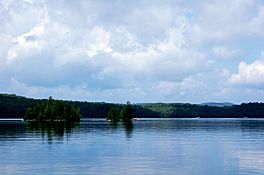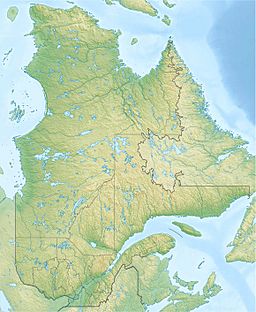Blue Sea Lake facts for kids
Quick facts for kids Blue Sea Lake |
|
|---|---|
 |
|
| Location | Blue Sea / Messines, Quebec |
| Coordinates | 46°13′0″N 76°03′20″W / 46.21667°N 76.05556°W |
| Primary outflows | Blue Sea River |
| Basin countries | Canada |
| Max. length | 10 km (6.2 mi) |
| Max. width | 3.4 km (2.1 mi) |
| Surface area | 14 km2 (5.4 sq mi) |
| Surface elevation | 165 m (541 ft) |
Blue Sea Lake (also known as Lac Blue Sea in French) is a beautiful lake located in Quebec, Canada. It's found near the towns of Blue Sea and Messines, Quebec, about 90 kilometers (56 mi) north of Gatineau. This lake is famous for its super clear water, and many cozy cottages are built along its shores.
The lake's name comes from its deep blue waters. It's so big and the land around it is so flat that it can feel like you're looking at a small sea! Blue Sea Lake feeds into the Blue Sea River, which then flows into the Picanoc River. The Picanoc River is a branch of the larger Gatineau River. The name "Blue Sea Lake" first appeared on a map in 1928.
There's another, smaller lake called Lac de la Mer Bleue (which also means "Blue Sea Lake") about 10 kilometers (6.2 mi) to the west in Cayamant. To avoid confusion, people usually use the English name "Blue Sea Lake" for this bigger lake, even when speaking French.
Discover Blue Sea Lake
Blue Sea Lake is a special place with clear waters and interesting stories. It's a great spot for enjoying nature and learning about local legends.
Where is Blue Sea Lake?
The town of Blue Sea is right in the middle of a region known as the Upper Gatineau. This area is full of other lakes, rivers, ponds, and wild natural spaces. Long ago, Blue Sea and its surroundings grew and became important because of the forest industry. This industry relied a lot on the many waterways in the region, especially the Gatineau River, to transport wood.
The Mystery of Misiganebic!
Imagine a huge, snake-like creature with a horse's head living in a lake! That's the legend of Misiganebic, a monster said to have lived in Blue Sea Lake. People reportedly saw this incredibly long, fast "seahorse" between 1913 and 1930.
After 1930, the monster seemed to disappear. Some say it was because more tourists started visiting the lake, and more motorized boats began traveling on its waters. However, there was a possible sighting around 1980 in the Baskatong Reservoir, much further north. The Algonquin people of Maniwaki called this monster "Misiganebic," or "Grand Serpent." They believed it could even create paths between lakes and appear in many nearby rivers and lakes.


